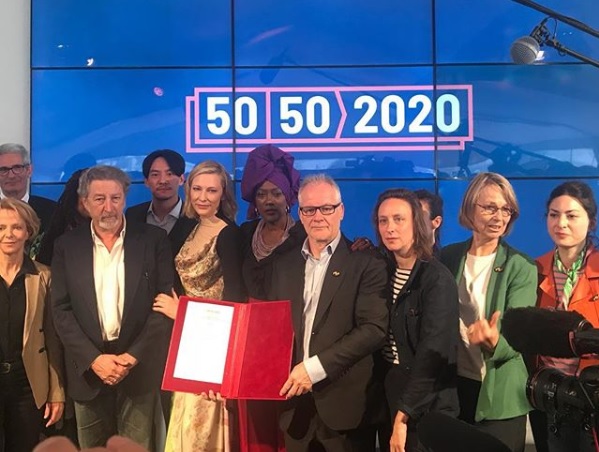The issue of the lack of female directors is dominating this year’s Cannes Film Festival. Part of this conversation is how movies get selected and who selects them. Is there a clear submission process? Is it mostly curated? Is it all about who Thierry Frémaux, the head of the festival, knows and likes and wants to see on his red carpet? The only way to figure out why year after year more women can’t get programmed here is to understand the process, which until now, has remained hidden. The women who organized the march of the 82 women were very savvy to tie a pledge for gender parity to the march to push Frémaux towards answering some of fundamental questions.
Yesterday, a full house gathered at the CNC tent on the beach on a rainy morning to witness this gender parity pledge being signed by Frémaux along with his colleagues at the Director’s Fortnight and Critics Week where they agreed to:
- Compile statistics according to gender, including the number of films submitted
- To identify the members of selection committees and programmers
- Make a commitment schedule to achieve parity on their board
Prior to the pledge signing there was a panel with women who have started organizations in different countries over the last several months in the wake of the reckoning rocking the film industry. There were representatives from Italy, Greece, and Spain, as well as the UK and the U.S. #TimesUp movements.
There is clearly very strong momentum to increase opportunities for women, to get a sense of the numbers in places where there have been no statistics previously, and to work together across borders to continue the push for change. But let’s not forget that there has been work going on for decades across the globe focused on this issue. Granted, this work hasn’t moved the dial enough, but it is important for the women who are new to this movement to make sure not to start over from the beginning and I encourage them to reach out to the people who have been working on this issue for some time. And a lot of the places on the forefront of this issue across the globe are women’s film festivals, which have been programming women directors for decades
When the time came for the signing of the pledge, it was clear that Frémaux was very uncomfortable. I am told he speaks perfect English, and yet he spoke only French and his comments were not translated. He made a couple of sexist joke and it seemed like he had never read the pledge before. It’s embarrassing. He is showing his lack of interest, and lack of understanding on this topic. But he signed, and now the key is to make sure that he is held accountable and, of course, to make sure there are more women-directed films in competition in the future.







